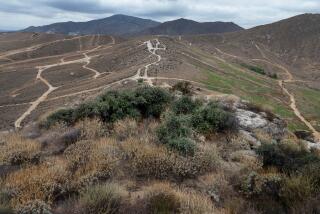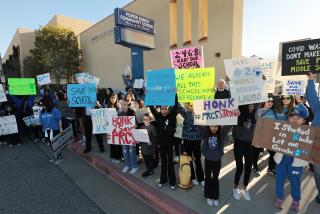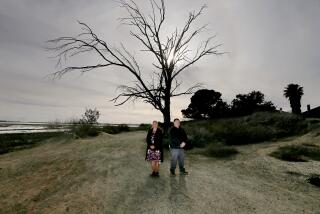Disputed Campus Project on Table
- Share via
The San Juan Capistrano City Council is expected to consider the fate Tuesday of a Catholic high school’s controversial plan to build athletic fields and a performing arts center on what Juaneno Indians call sacred land.
The council, which has been poring over a 5-inch-thick environmental report on the proposal, is scheduled to hear about three hours of public testimony and an hourlong presentation from Junipero Serra High School officials. It is unclear whether the council would vote at Tuesday night’s special meeting or continue the matter into next month.
“This is by far the most scrutinized project I’ve dealt with,” said San Juan Capistrano Mayor Joe Soto. “It’s been a demanding process, not only on city staff but the applicant as well.”
Junipero Serra boosters have submitted plans for 29 acres of open space on the north end of town to five city commissions, including the planning commission three times.
Two weeks ago, the planning commission rejected the proposal, 3 to 2, after several members said the performing arts center would make the site too congested.
That vote gave some hope to a group of Juaneno Indians who have been fighting the project since its inception more than two years ago.
“The planning commission surprised us,” said Rebecca Robles, a member of the Juaneno tribe. “We thought they would just move it through.”
Soto said he had not made up his mind.
“It’s a hard call at this point,” he said. “I think there will be some emotional testimony. It’s up to us to pull ourselves away from this and get down to the facts and figure out what’s best for our residents.”
The school, which opened last fall and has an enrollment of about 300, plans to build an Olympic-size pool, gymnasium, tennis courts and fields for baseball, softball, soccer and football across from the main campus. The 29 acres in dispute had been zoned for office and retail use until the city gave the school tentative approval last year to build athletic fields and a performing arts center.
Two factions of the Juanenos, including Robles’ group, prefer that the site be used for a cultural center to honor their ancestors. David Belardes, who leads a third faction of the Juaneno Band of Mission Indians Acjachemen Nation, agreed to support the school after campus officials promised not to destroy any burial sites and to erect monuments recognizing tribal leaders.
If the council approves the plan, Robles said, her group could file a lawsuit to block construction.
“We know there are at least 200 of our ancestors’ remains on this land,” Robles said.
“If this site is developed, it will not only be a significant loss for the Acjachemen people, but for the history of California,” she said.
More to Read
Sign up for Essential California
The most important California stories and recommendations in your inbox every morning.
You may occasionally receive promotional content from the Los Angeles Times.










